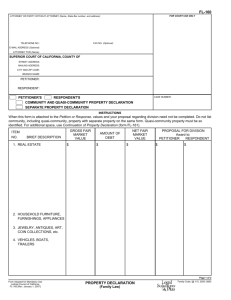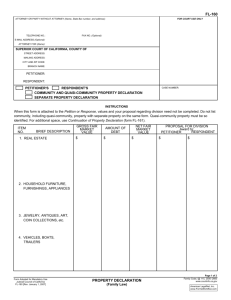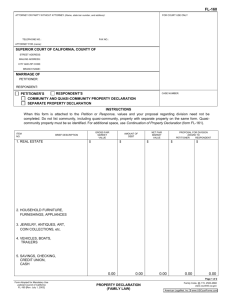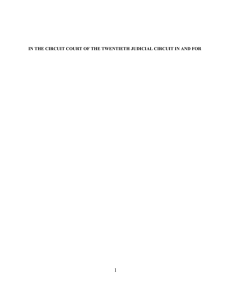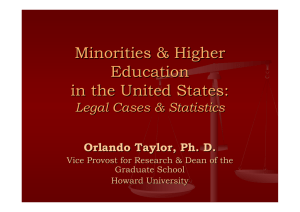JTIP
advertisement
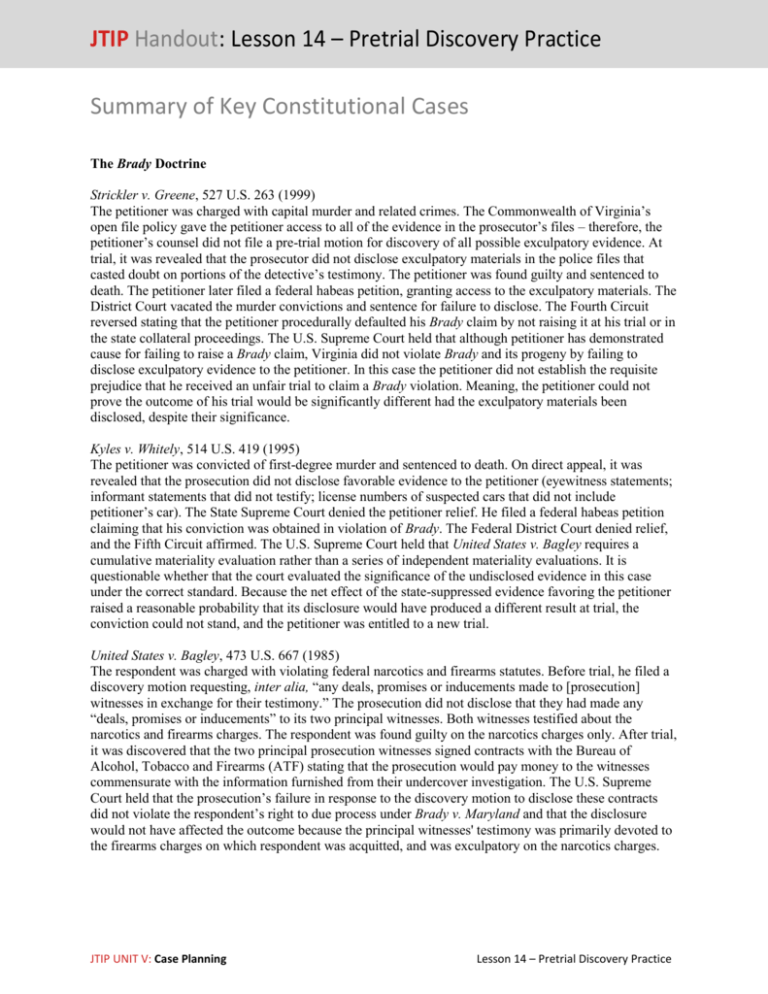
JTIP Handout: Lesson 14 – Pretrial Discovery Practice Summary of Key Constitutional Cases The Brady Doctrine Strickler v. Greene, 527 U.S. 263 (1999) The petitioner was charged with capital murder and related crimes. The Commonwealth of Virginia’s open file policy gave the petitioner access to all of the evidence in the prosecutor’s files – therefore, the petitioner’s counsel did not file a pre-trial motion for discovery of all possible exculpatory evidence. At trial, it was revealed that the prosecutor did not disclose exculpatory materials in the police files that casted doubt on portions of the detective’s testimony. The petitioner was found guilty and sentenced to death. The petitioner later filed a federal habeas petition, granting access to the exculpatory materials. The District Court vacated the murder convictions and sentence for failure to disclose. The Fourth Circuit reversed stating that the petitioner procedurally defaulted his Brady claim by not raising it at his trial or in the state collateral proceedings. The U.S. Supreme Court held that although petitioner has demonstrated cause for failing to raise a Brady claim, Virginia did not violate Brady and its progeny by failing to disclose exculpatory evidence to the petitioner. In this case the petitioner did not establish the requisite prejudice that he received an unfair trial to claim a Brady violation. Meaning, the petitioner could not prove the outcome of his trial would be significantly different had the exculpatory materials been disclosed, despite their significance. Kyles v. Whitely, 514 U.S. 419 (1995) The petitioner was convicted of first-degree murder and sentenced to death. On direct appeal, it was revealed that the prosecution did not disclose favorable evidence to the petitioner (eyewitness statements; informant statements that did not testify; license numbers of suspected cars that did not include petitioner’s car). The State Supreme Court denied the petitioner relief. He filed a federal habeas petition claiming that his conviction was obtained in violation of Brady. The Federal District Court denied relief, and the Fifth Circuit affirmed. The U.S. Supreme Court held that United States v. Bagley requires a cumulative materiality evaluation rather than a series of independent materiality evaluations. It is questionable whether that the court evaluated the significance of the undisclosed evidence in this case under the correct standard. Because the net effect of the state-suppressed evidence favoring the petitioner raised a reasonable probability that its disclosure would have produced a different result at trial, the conviction could not stand, and the petitioner was entitled to a new trial. United States v. Bagley, 473 U.S. 667 (1985) The respondent was charged with violating federal narcotics and firearms statutes. Before trial, he filed a discovery motion requesting, inter alia, “any deals, promises or inducements made to [prosecution] witnesses in exchange for their testimony.” The prosecution did not disclose that they had made any “deals, promises or inducements” to its two principal witnesses. Both witnesses testified about the narcotics and firearms charges. The respondent was found guilty on the narcotics charges only. After trial, it was discovered that the two principal prosecution witnesses signed contracts with the Bureau of Alcohol, Tobacco and Firearms (ATF) stating that the prosecution would pay money to the witnesses commensurate with the information furnished from their undercover investigation. The U.S. Supreme Court held that the prosecution’s failure in response to the discovery motion to disclose these contracts did not violate the respondent’s right to due process under Brady v. Maryland and that the disclosure would not have affected the outcome because the principal witnesses' testimony was primarily devoted to the firearms charges on which respondent was acquitted, and was exculpatory on the narcotics charges. JTIP UNIT V: Case Planning Lesson 14 – Pretrial Discovery Practice JTIP Handout: Lesson 14 – Pretrial Discovery Practice Brady v. Maryland, 373 U.S. 83 (1963) The defendant and co-defendant were convicted of first-degree murder and sentenced to death. Before trial, defense counsel requested the prosecution to allow him to examine the co-defendant’s extrajudicial statements. While the prosecution did show defense counsel several statements, one statement in which the co-defendant admitted to the actual killing was withheld and did not come to the defense’s attention until after conviction and sentencing. The U.S. Supreme Court held that withholding evidence favorable to an accused that has requested it violates due process where the evidence is material to either guilt or to punishment, irrespective if done in good or bad faith by the prosecution. In this case, restricting the petitioner’s new trial to the question of punishment did not deny the petitioner due process or equal protection of the laws under the Fourteenth Amendment because the suppressed evidence was only admissible to the issue of punishment. Right Against Prosecutorial Suppression of Evidence Favorable to the Defense Wylde v. Wyoming, 362 U.S. 607 (1960) The petitioner alleged by writ of habeas corpus that he “had no counsel present” when he pleaded guilty to second-degree murder and that the prosecutor suppressed testimony favorable to petitioner. The U.S. Supreme Court vacated the judgment and remanded the case for a hearing on the petitioner’s allegations. Pyle v. Kansas, 317 U.S. 213 (1942) A petition for a writ of habeas corpus alleged that the petitioner was imprisoned following conviction through the use of perjured testimony, knowingly by the prosecution, by the prosecuting officers. The writ of habeas corpus was denied without a determination of truth to the allegations. The U.S. Supreme Court reversed the denial and the state court was required to review the affirmance of a judgment denying the application for writ of habeas corpus. In light of the petitioner’s inexpert drafting of the writ of habeas corpus, the Court did not foreclose any procedure designed to achieve more particularity in petitioner’s allegations and assertions. If the allegations were true, the petitioner would be entitled to release from custody. Sixth Amendment Right to Counsel Coleman v. Alabama, 399 U.S. 1 (1970) The petitioners were convicted of assault with intent to murder and the Alabama Court of Appeals affirmed. They argued that (1) the in-court identifications that were made of them were fatally tainted by a prejudicial station house line-up and (2) that Alabama's failure to provide them with appointed counsel at the preliminary hearing, a “critical stage” of the prosecution, unconstitutionally denied them the assistance of counsel. The sole purposes of a preliminary hearing under Alabama law were to determine whether there was sufficient evidence to warrant presenting the case to a grand jury and to fix bail for bailable offenses. The trial court followed Pointer v. Texas, 380 U.S. 400 (1965), which prohibits the use of testimony given at a pre-trial proceeding where the accused did not have the benefit of crossexamination by and through counsel. However, the U.S. Supreme Court still vacated the convictions and remanded the case to determine whether the denial of counsel at the preliminary hearing was harmless error. JTIP UNIT V: Case Planning Lesson 14 – Pretrial Discovery Practice JTIP Handout: Lesson 14 – Pretrial Discovery Practice Right to Fair Notice of Charges In re Gault, 387 U.S. 1 (1967) The United States Supreme Court held that a youth has the right to notice of charges, to counsel, to confrontation and cross-examination of witnesses and the privilege against self-incrimination. The petition to the Supreme Court sought the release of Gerald Francis Gault, the appellants’ 15-year-old son, who had been committed as a juvenile delinquent to the State Industrial School by the Juvenile Court of Gila County, Arizona. The Supreme Court stated, “the condition of being a boy does not justify a kangaroo court,” and reversed the judgment of the Arizona Supreme Court, remanding the case for further proceedings. Cole v. Arkansas, 333 U.S. 196 (1948) The petitioners were tried and convicted in a state court under an information charging them only with a violation of § 2 of a state statute making it an offense to promote an unlawful assemblage. They appealed to the State Supreme Court, contending, inter alia, that § 2 was contrary to the Federal Constitution. Without passing on that question, the State Supreme Court sustained their convictions based on the information charged and the evidence showing that petitioners had violated § 1 of the same statute, which describes the distinct offense of using force and violence. The U.S. Supreme Court held that the petitioners were denied due process of law and the judgment was reversed and remanded to the State Supreme Court for further proceedings. It is as much a violation of due process to send an accused to prison following a conviction of a charge on which he was never tried as it would be to convict him upon a charge that was never made. To conform to due process of law, petitioners were entitled to have the validity of their convictions appraised on consideration of the case as it was tried and as the issues were determined in the trial court. Right to Present Defense Evidence Pennsylvania v. Ritchie, 480 U.S. 39 (1987) The respondent was charged with various sexual offenses against his minor daughter. During pre-trial discovery, the respondent served child protective services with a subpoena, seeking access to files that may contain the names of favorable witnesses, as well as other unspecified exculpatory evidence. The agency refused to comply with the subpoena, claiming that the records were privileged. In trial court, the judge refused disclosure during an in-chambers hearing, and the respondent was convicted. On appeal, the Pennsylvania Superior Court vacated the conviction and remanded the case. On the State’s appeal, the Pennsylvania Supreme Court agreed with the Superior Court, further concluding that defense counsel was entitled to review the entire file for any useful evidence. The U.S. Supreme Court held that the respondent was entitled to have the file reviewed by the trial court to determine whether it contains information that probably would have changed the outcome of his trial; however, the Pennsylvania Supreme Court erred in holding that defense counsel must be allowed to examine the confidential information. Both respondent’s and the State’s interests in ensuring a fair trial could be protected fully by requiring that the files be submitted only to the trial court for in camera review. The judgment was therefore affirmed in part, reversed in part, and remanded. Webb v. Texas, 409 U.S. 95 (1972) Holding that the trial court’s extended admonition to petitioner’s only witness to refrain from lying, coupled with threats of dire consequences if the witness did lie, effectively discouraged the witness from testifying at all and deprived the petitioner of due process of law by denying him the opportunity to present witnesses in his own defense. JTIP UNIT V: Case Planning Lesson 14 – Pretrial Discovery Practice JTIP Handout: Lesson 14 – Pretrial Discovery Practice Indigent Youth’s Right to Basic Tools of a Defense Britt v. North Carolina, 404 U.S. 226 (1971) The petitioner was convicted of murder a month after his previous trial ended with a hung jury. Both trials took place in a small town before the same judge and with the same counsel and court reporter, who (as was conceded) was well known to defense counsel and other local lawyers and would have read back his notes to defense counsel before the second trial had he been asked to do so. Between the two trials the petitioner, alleging indigency, filed a motion for a free transcript, which the trial court denied. The appellate court affirmed the conviction, holding that an adequate alternative to the transcript was available. The U.S. Supreme Court held, in the narrow circumstances of this case, a transcript was not needed for the petitioner’s defense. A defendant who claims the right to a free transcript does not bear the burden of proving that alternatives suggested by the State or conjured up by a court were inadequate in hindsight. However, in this case the petitioner conceded that he had available an informal alternative (having the reporter read back to counsel his notes of the mistrial, well in advance of the second trial, if counsel had simply made an informal request) which appears to be substantially equivalent to a transcript. Informant’s Privilege Roviaro v. United States, 353 U.S. 53 (1957) The petitioner was convicted of knowingly possessing and transporting heroin imported unlawfully. The petitioner repeatedly demanded that the prosecution disclose the identity of an undercover informer who had taken a material part in bringing about petitioner’s possession of the drugs, had been present with petitioner at the occurrence of the alleged crime and might have been a material witness as to whether the petitioner knowingly transported the drugs as charged. The trial court sustained the prosecution’s refusal to disclose. The U.S. Supreme Court held that in the circumstances of this case, failure of the court to require disclosure of the identity of the informer was reversible error. “Where disclosure of an informer’s identity, or of the contents of his communication, is relevant and helpful to the defense of an accused, or is essential to a fair trial, the Government’s privilege to withhold disclosure of the informer's identity must give way.” 353 U. S. 53 at 60-62. Responding to Prosecutorial Barriers to Discovery Goldberg v. United States, 425 U.S. 94 (1976) During the petitioner’s trial, the chief prosecution witness indicated on cross-examination that he was interviewed by the prosecution who took notes relating to his testimony. The petitioner moved for production of the notes pursuant to the Jencks Act, 18 U.S.C. § 3500, providing that in a federal criminal prosecution after a witness called by the Government has testified on direct examination, the court, on the defendant's motion, shall order the Government to produce any “statement” in its possession that relates to the subject matter of the witness’ testimony. The trial judge denied petitioner’s motion on the ground that the material was “the work product of counsel.” Court of Appeals affirmed on the ground that the notes were not statements of the witness within the meaning of the statute. The U.S. Supreme Court held that any writing prepared by a Government lawyer relating to the subject matter of the testimony of a Government witness that has been “signed or otherwise adopted or approved” by that witness is producible under the Jencks Act, and the writing is not rendered non-producible because a Government lawyer interviewed the witness and wrote the statement. See also Campbell v. United States, 373 U. S. 487, 373 U. S. 493 (Campbell II) (1963). The decision was vacated, and the case was remanded. Davis v. Alaska, 415 U.S. 308 (1974) The petitioner was convicted of grand larceny and burglary following a trial in which the trial court, on motion of the prosecution, issued a protective order prohibiting questioning a key prosecution witness, concerning the witness’ adjudication as a juvenile delinquent relating to a burglary and his probation JTIP UNIT V: Case Planning Lesson 14 – Pretrial Discovery Practice JTIP Handout: Lesson 14 – Pretrial Discovery Practice status at the time of the events as to which he was to testify. The trial court’s order was based on state provisions protecting the anonymity of youth offenders. The Alaska Supreme Court affirmed. The U.S. Supreme Court held that the petitioner was denied his right to confrontation of witnesses under the Sixth and Fourteenth Amendments. The defense was entitled to attempt to show bias on behalf of the prosecution witness because of his vulnerable status as a probationer and his concern that he might be a suspect in the burglary charged against petitioner. The consequences of disclosing the witness’ juvenile court record and probation status were outweighed by petitioner's right to effectively cross-examine a witness. The decision was reversed, and the case was remanded. United States v. Reynolds, 345 U.S. 1 (1953) A military aircraft on a flight to test secret electronic equipment crashed, and certain civilian observers aboard were killed. Their widows sued the United States under the Tort Claims Act and moved under Rule 34 of the Federal Rules of Civil Procedure for production of the Air Force’s accident investigation report and statements made by surviving crewmembers during the investigation. The Secretary of the Air Force refused disclosure stating that the matters were privileged against disclosure under Air Force regulations because the aircraft and its personnel were “engaged in a highly secret mission.” The District Court entered judgment against the Government. The Court of Appeals affirmed. The U.S. Supreme Court held that in this case, there was a valid claim of privilege, and refusal to produce the documents subjected the United States to liability to which Congress did not consent by the Tort Claims Act. The decision was reversed, and the case was remanded. Duty to Preserve Evidence Arizona v. Youngblood, 488 U.S. 51 (1981) A young boy was sexually assaulted and taken to the hospital where a physician collected samples using a “sexual assault kit.” The police also collected the boy's clothing, which they failed to refrigerate. A police criminologist later performed some tests on swabs from the “kit” and the boy’s clothing, but he was unable to obtain information about the identity of the boy's assailant. At trial, expert witnesses testified that respondent might have been completely exonerated by timely performance of tests on properly preserved semen samples. The respondent was convicted of child molestation and related charges in an Arizona state court. The Arizona Court of Appeals reversed the conviction on the ground that the State had breached a constitutional duty to preserve the semen samples from the victim’s body and clothing. The U.S. Supreme Court held that the Due Process Clause did not require the State to preserve the semen samples even though the samples might have been useful to respondent. Unless a criminal defendant can show bad faith on the part of the police, failure to preserve potentially useful evidence does not constitute a denial of due process of law. None of the information regarding the police’s negligence was concealed from respondent at trial, and the evidence was made available to respondent’s expert. The decision was reversed. JTIP UNIT V: Case Planning Lesson 14 – Pretrial Discovery Practice JTIP Handout: Lesson 14 – Pretrial Discovery Practice Fifth Amendment Limitations on Prosecutorial Discovery United States v. Hubbell, 530 U.S. 27 (2000) The respondent in this case promised to provide Independent Counsel investigating matters relating to the Whitewater Development Corporation with information as part of a plea agreement. Counsel then issued a subpoena ordering the respondent to produce documents for a grand jury in Arkansas – however, the respondent invoked his Fifth Amendment privilege against self-incrimination before the grand jury and did not state whether he had the documents. The prosecutor ordered production of the documents under federal statute and granted the respondent immunity. The respondent complied. The Independent Counsel later used these documents to indict the respondent on tax charges. The District Court dismissed the indictment because the evidence that would be used against the respondent was derived either directly or indirectly from his immunized act of producing those documents. The Court of Appeals vacated the decision and directed the District Court to determine the scope of the Government's knowledge of the respondent’s financial affairs on the day the subpoena was issued. The court determined that if the Government could not demonstrate “knowledge” with reasonable particularity, then the indictment was tainted. Independent Counsel could not meet this standard and entered into a conditional plea agreement providing for the dismissal of the indictment, unless the Supreme Court’s disposition of the case made it reasonably likely that the respondent’s immunity would not pose a significant bar to his prosecution. The U.S. Supreme Court affirmed the decision holding that a person responding to subpoena with a promise of immunity could not be prosecuted on the basis of that information in the documents if the government did not have prior, independent knowledge of the documents. United States v. Doe, 465 U.S. 605 (1984) During a federal grand jury investigation of corruption, subpoenas were served on the respondent demanding production of certain business records of several of his companies. The respondent then filed a motion in Federal District Court seeking to quash the subpoenas. The District Court granted the motion (except as to records required by law to be kept or disclosed to a public agency), finding that the act of producing the records would involve testimonial self-incrimination. The Court of Appeals affirmed and further held that, in view of the Government’s failure to make a formal request for use immunity under 18 U.S.C. §§ 6002 and 6003, it was proper to reject the Government's attempt to compel delivery of the records. The U.S. Supreme Court held that the contents of the subpoenaed records in question were not privileged under the Fifth Amendment. That Amendment protects the person asserting the privilege only from compelled self-incrimination. Fisher v. United States, 425 U. S. 391, 425 U. S. 396 (1976). Where the preparation of business records is voluntary, no compulsion is present. However, the act of producing the documents at issue in this case was privileged and could not be compelled without a statutory grant of use immunity pursuant to 18 U.S.C. §§ 6002 and 6003. The decision was affirmed in part, reversed in part, and remanded. New Jersey v. Portash, 440 U.S. 450 (1979) The respondent testified before a state grand jury under a state immunity statute that prevents a public employee’s grand jury testimony or evidence derived thereof from being used against him in a subsequent criminal proceeding. The respondent was later charged with misconduct in office and extortion. At trial the judge ruled that the respondent’s grand jury testimony could be used to impeach his credibility if he testified. As a result, the respondent did not testify, and he was convicted. The New Jersey appellate court held that the use of the immunized grand jury testimony to impeach the respondent would have violated the Constitution, and, because the respondent’s decision not to testify was based on the trial court’s erroneous ruling, reversed the conviction and remanded for a new trial. The U.S. Supreme Court held that the Fifth Amendment privilege against compulsory self-incrimination was made binding on the states by the Fourteenth Amendment, therefore the respondent's testimony before the grand jury under a grant of immunity could not constitutionally be used against him in the later criminal trial. The decision was affirmed. JTIP UNIT V: Case Planning Lesson 14 – Pretrial Discovery Practice JTIP Handout: Lesson 14 – Pretrial Discovery Practice Fisher v. United States, 425 U.S. 391 (1976) Taxpayers being investigated for possible civil or criminal liability under the federal income tax laws obtained documents relating to preparation of their tax returns, which were then transferred to their respective attorneys. The IRS served summonses on the attorneys to produce the documents, but the attorneys refused to comply. The District Court ordered the summonses enforced. In No. 74-18 the Court of Appeals affirmed, holding that the taxpayers had never acquired a possessory interest in the documents and that the documents were not immune from production in the attorneys’ hands. But in No. 74-611, the Court of Appeals reversed, holding that under the Fifth Amendment, the documents would have been privileged from production pursuant to a summons directed to the taxpayer if he had retained possession, and that, in light of the attorney-client relationship, the taxpayer retained such privilege after giving the documents to his attorney. The U.S. Supreme Court held that compelled production of the documents did not implicate any Fifth Amendment privilege. Further, although the attorney-client privilege applies to documents in the hands of an attorney that would have been privileged in the hands of the client by reason of the Fifth Amendment, the clients are not protected in this case because their production did not involve incriminating testimony and were not immune. No. 74-18, 500 F.2d 683, was affirmed; No. 74-611, 499 F.2d 444, was reversed. Wardius v. Oregon, 412 U.S. 470 (1973) A witness’ alibi evidence was struck as a sanction for the petitioner’s failure to file notice of alibi in accordance with Oregon law at trial. The petitioner was also not allowed to give alibi testimony. The petitioner was convicted. The Court of Appeals affirmed the conviction and rejected the petitioner’s constitutional challenge to the state statute, which grants no discovery rights to criminal defendants. The U.S. Supreme Court held that reciprocal discovery is required by fundamental fairness. In the absence of fair notice that the petitioner will have an opportunity to discover the State’s rebuttal witnesses, the petitioner cannot be required to reveal his alibi defense under the due process of law. The decision was reversed, and the case was remanded. Brooks v. Tennessee, 406 U.S. 605 (1972) The U.S. Supreme Court held that Tennessee’s requirement that a defendant in a criminal proceeding “desiring to testify shall do so before any other testimony for the defense is heard by the court trying the case” violates the defendant's privilege against self-incrimination. A defendant may not be penalized for remaining silent at the close of the State’s case by being excluded from the stand later in the trial. The Supreme Court also held that the Tennessee rule infringes the defendant’s constitutional rights by depriving him of the “guiding hand of counsel,” in deciding not only whether the defendant will testify but, if so, at what stage. The decision was reversed, and the case was remanded. Hoffman v. United States, 341 U.S. 479 (1951) The petitioner refused to answer certain questions asked by a special federal grand jury investigating violations of a number of federal criminal statutes and conspiracies to violate them, claiming that his answers might tend to incriminate him. The judge who had impaneled the grand jury, and was familiar with these circumstances, found no real and substantial danger of incrimination to the petitioner and ordered him to answer. The petitioner stated that he would not obey the order, and he was convicted of criminal contempt. The U.S. Supreme Court reversed the conviction stating that the privilege against selfincrimination guaranteed by the Fifth Amendment extends not only to answers that would in themselves support a conviction under a federal criminal statute, but also to those which would furnish a link in the chain of evidence needed to prosecute the claimant for a federal crime. Blau v. United States, 340 U. S. 159 (1950). JTIP UNIT V: Case Planning Lesson 14 – Pretrial Discovery Practice

